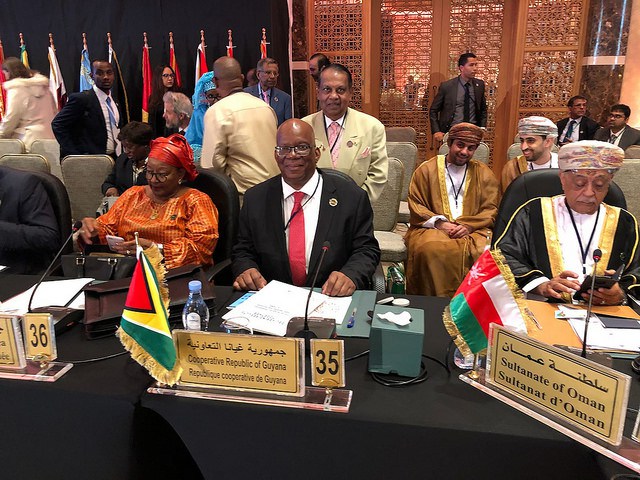
Minister of Finance, Winston Jordan during the 43rd Annual Meeting of the IsDB Group in Tunisia
By Ray Chickrie
Caribbean News Now contributor
GEORGETOWN, Guyana — Guyana’s finance minister, Winston Jordan, who attended the annual Islamic Development Bank (IsDB) governors meeting in Tunis last week, revealed that the bank has offered Guyana US$900 million to support socio-economic and infrastructure development in form of mostly loans and grants.
The aid will also address capacity building and technology transfer through the bank’s reverse linkage south/south cooperation by matching Guyana’s needs with that of other member states like Malaysia and Indonesia to improve agriculture, education, healthcare, tourism and microeconomic planning.
Dr Anwar Lall Mohamed, Suriname’s alternative governor to the IsDB, said that conventional banks demand about “15 to 20 percent interest, and it is killing us; we give 20 percent back to the bank”. However, the IsDB soft loans are on more favourable terms for developing countries like Guyana and Suriname.
The Islamic Bank has also offered Suriname a loan of US$1 billion.
The ministry of finance of Guyana will play a crucial role as the “primary interlocutor” for the IsDB group with Guyana’s private and public sector by linking them with the International Islamic Trade Financing Corporation (ITFC), the Islamic Corporation for Insurance of Investment and Export Credit (ICIEC), the Islamic Corporation for the Development of the Private Sector (ICD) and the Islamic Research and Training Institute (IRTI).
Thus, part of the offer of US$900 million will also go to develop the private sector, on which the bank is placing emphasis.
Dr Bandar Hajjar, president of the IsDB, said that the development model of most member states, which heavily relies on state institutions, must be changed.
He said, “Member countries need $120 billion only for the energy sector, but the bank could only cater to eight percent of these needs,” he said, adding that $3 trillion is required to address the gap in infrastructure.
“But we are encouraging the involvement of the private sector to work together in addressing our development challenges,” Hajjar concluded.
This is welcome news for countries like Guyana and Suriname that fit this profile and that needs to change.
Guyana and the IsDB will sign a long term agreement, the Interim Member Country Partnership Strategy, which will set out their cooperation. In that document, the IsDB identified various areas for its support like agriculture, healthcare, education and infrastructure.
Jordan is looking to benefit from the products offered by the Islamic Bank group.
Guyana is moving its focus to aid private sector entrepreneurs and businesses by linking them with financial institutions such as the Islamic Cooperation for the Development of the Private Sector (ICD), which are ideal for financing and supporting small and medium enterprises (SMEs). SMEs and high-growth start-ups are the engine of economic growth in both developed and developing countries.
Jordan said that he is keen to expand Guyana’s ties with the Islamic Bank group to “accelerate Guyana’s development programmes.” Jordan took advantage of the Tunis meeting to “seek out opportunities to engage and create mutually beneficial relationships with other oil producing nations to aid in the development of Guyana’s oil and gas sector.”
The finance minister said that Guyana and the bank are in advanced stages of project development in varying sectors: reverse linkage project for rice development; rehabilitation of the Palms Geriatric Facility; and energy support to Guyana Power and Light.
In the rice sector, Guyana will benefit soon also from a cooperation agreement between Malaysia and the Islamic Bank. This “reverse linkage” south/south cooperation is now being implemented in Suriname, and it will include larger scale agriculture, including coconut, pineapple cultivation, processing and export.
Guyana has the option of how much it wants to draw from the IsDB offer of US$900 million, but it is unlikely that this sum will be utilised anytime soon. The IsDB applies stringent oversight and vetting in approving and executing projects. The process is very transparent and projects must be sound. Guyana’s finance ministry, like other ministries in Guyana and Suriname, are facing capacity issue due to brain drain. This stalls development and the inability of both countries to utilize the funds offered by the bank.
Not surprisingly, Guyanese bloggers and some elements in the opposition have already displayed Islamophobia and hysteria regarding Jordan’s push to expand ties with the IsDB and especially the bank’s offer of US$900 million to support Guyana’s development.
Meanwhile, excellent working relationship between the finance ministers of Suriname and Guyana, and especially now that Guyana joined the IsDB, a regional office of the IsDB will soon open in the Caribbean.
According to Jordan, the IsDB is in the process of establishing a regional office in Paramaribo, Suriname. This office will have operational oversight for Suriname, Guyana and the extended Caribbean Community (CARICOM) and Latin American region.


